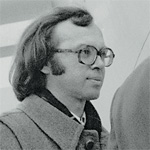Genuine and equal partners
From 1966, Nicolas Koulberg acted as translator and link person between CERN and Russian scientists, both in Geneva and in the Soviet Union. He is now advisor to the Director-General concerning relations between CERN and Russia, the Commonwealth of Independent States, and other eastern countries.
 “I started casual work at CERN while I was doing my thesis on Russian literature at the University of Geneva. After finishing my studies, I was asked to help as an interpreter for the new joint experiments, and I spent the next three years helping the Soviet specialists here in Geneva and the scientists from CERN who had moved to Serpukhov with their families. There they lived in multi-story buildings in the nearby village Protvino, where we tried to make sure that living conditions were as comfortable as possible and working conditions acceptable.
“I started casual work at CERN while I was doing my thesis on Russian literature at the University of Geneva. After finishing my studies, I was asked to help as an interpreter for the new joint experiments, and I spent the next three years helping the Soviet specialists here in Geneva and the scientists from CERN who had moved to Serpukhov with their families. There they lived in multi-story buildings in the nearby village Protvino, where we tried to make sure that living conditions were as comfortable as possible and working conditions acceptable.
The political situation in the Soviet Union was very difficult. Looking back, I do not understand how we succeeded to send such sophisticated equipment for the experiments to Russia, including the most powerful computer of the time. A second problem was how to make the arrival of a Soviet military airplane acceptable to Swiss authorities. It was the first time that such a plane was seen in the West.
Rules were tough, Russia was not a free country at the time — it was behind the iron curtain. But the Russians soon realized that they could not collaborate without opening up. We made real progress in convincing the authorities that the people were being invited to CERN to share knowledge — without the spirit of spying. Officially, the rules were still applied, but reality was different, there was no strong enforcement.
The first joint experiments were done not only with CERN, but also with other European institutes. All European physicists found the door opened through CERN; they could meet scientists in Russia, who in the following decades came to CERN, bringing their intellectual, financial, and in-kind contributions. The CERN-Russia collaborations produced good scientific results, and many different laboratories were included, not only the big institutes.
The first experiments we did in Russia were necessary to understand the people there and how they work. We found the same spirit — to do science and to obtain better knowledge. Only after establishing this common base could we become genuine and equal partners. The Russians are now involved in all stages of an experiment: conception, equipment, and analysis.
Groups that came together 30 years ago are still working together. Without this long-term knowledge and progressive understanding of each other, current collaborations, such as for the Large Hadron Collider, would not have been possible.”

